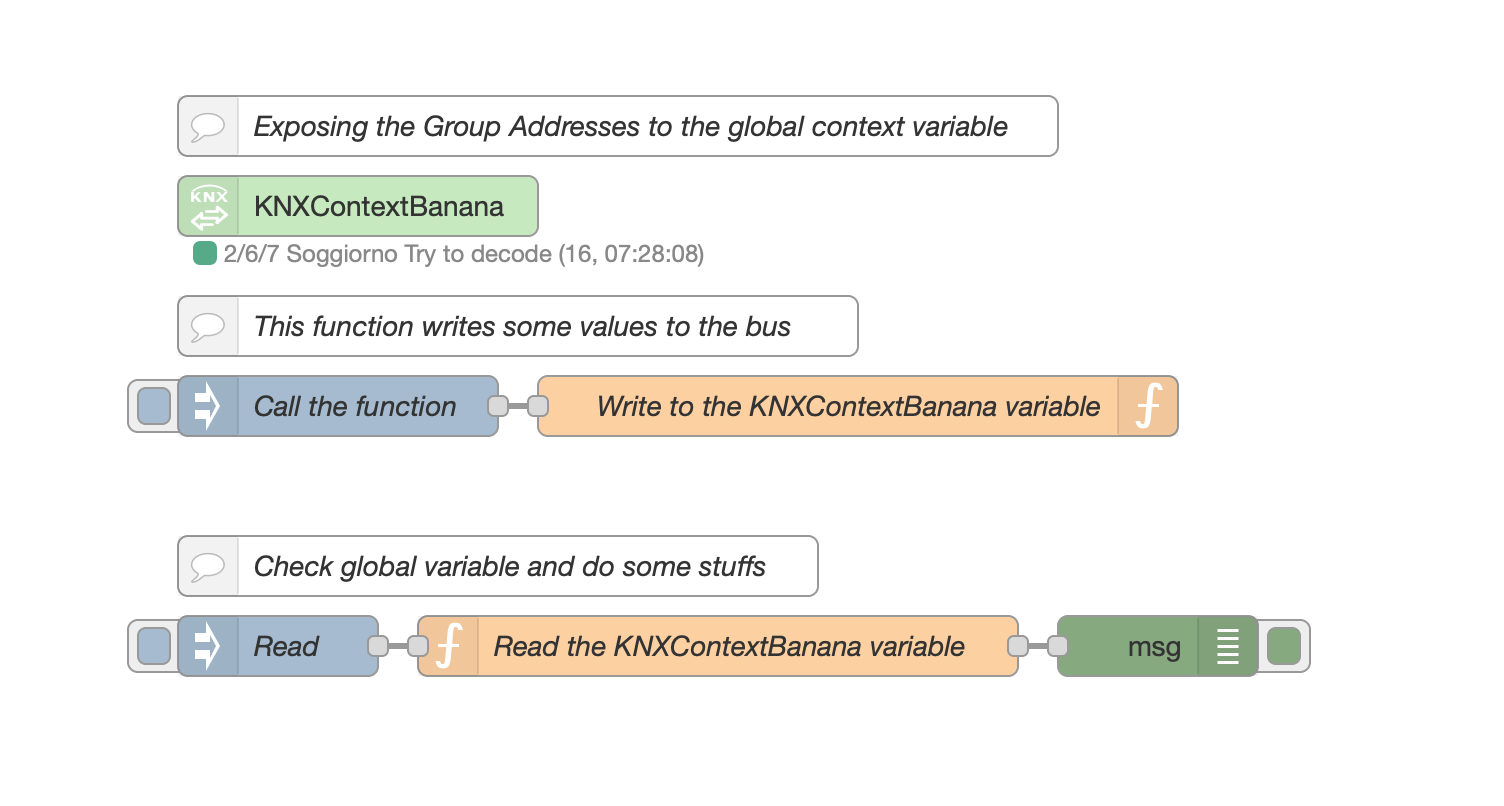-
Notifications
You must be signed in to change notification settings - Fork 34
it GlobalVariable
Questo nodo espone l'indirizzo di gruppo ricevuto dal bus a una variabile globale
Puoi scrivere sul BUS KNX semplicemente aggiornando la variabile globale!
Inserisci un Global Context Node nel flusso, quindi assegnagli un nome.
Il nome che dai al nodo diventerà il nome della variabile di contesto globale.
È tutto. Per motivi di sicurezza, cambia il nome del nodo predefinito
Puoi accedere alla variabile globale aggiungendo il suffisso _READ al nome del nodo.
Puoi abilitare/disabilitare la variabile di contesto globale o abilitare READONLY o READ/WRITE nella finestra di configurazione.
È possibile inviare un comando di scrittura sul BUS KNX, semplicemente modificando il nome della variabile globale con il suffisso _WRITE. Dopo che i comandi sono stati eseguiti, la variabile globale con suffisso _WRITE viene automaticamente svuotata, per non ripetere all'infinito i comandi.
- Gateway
Gateway KNX selezionato.
- Nome variabile
Nome della variabile globale. Verranno create 2 variabili con questo nome, una con suffisso _READ (per la lettura degli indirizzi di gruppo) e l'altra con suffisso _WRITE (per la scrittura degli indirizzi di gruppo). Per esempio, se il nome della variabile è "KNXGlobalContext", vengono create le 2 variabili KNXGlobalContext_READ e KNXGlobalContext_WRITE. Poichè la variabile globale è visibile da tutti i nodi (anche quelli non KNX-Ultimate), per ragioni di sicurezza, imposta un nome diverso da quello di default.
// Proprietà della variabile, sia in lettura che in scrittura
{
address : "0/0/1",
dpt: "1.001",
payload: true,
devicename:"Dinning Room->Table Light"
}
- Esponi come variabile globale
Scegli se e come vuoi esporre la variabile globale. Se non intendi scrivere sul BUS KNX, per sicurezza, lascia "sola lettura.
- Intervallo scrittura su BUS
Il nodo controlla la variabile con suffisso _WRITE ad intervalli regolari per scrivere sul bus KNX. Scegli l'intervallo che preferisci.
This node exposes the group address received from the bus, to a global variable
You can write to the KNX BUS by simply update the global variable!
Put a Global Context Node into the flow, then give it a name.
The name you give to the node, will become the global context variable's name.
That's all. For security reasons, please change the default node name
You can access the global variable by adding the suffix _READ to the node's name.
You can enable/disable the global context variable, or enable READONLY or READ/WRITE in the configuration window.
You can issue a KNX BUS write command, by simply modify the global variable name with suffix _WRITE. After the commands have been executed, the global variable with suffix _WRITE is automatically emptied, not to infinitely repeat the commands.

View code
Adjust the nodes according to your setup
[{"id":"ababb834.9073","type":"knxUltimateGlobalContext","z":"5ed79f4a958a1f20","server":"b60c0d73.1c02b","name":"KNXContextBanana","exposeAsVariable":"exposeAsVariableREADWRITE","writeExecutionInterval":"1000","x":230,"y":200,"wires":[]},{"id":"2954e7ea.f53988","type":"function","z":"5ed79f4a958a1f20","name":"Write to the KNXContextBanana variable","func":"// This function writes some values to the KNX bus\nlet GroupAddresses = [];\nGroupAddresses.push ({address: \"0/0/10\", dpt:\"1.001\", payload:true});\nGroupAddresses.push({ address: \"0/0/11\", dpt: \"1.001\", payload: true });\nGroupAddresses.push({ address: \"0/0/12\", dpt: \"1.001\", payload: false });\n\n// You can also avoid setting datapoint.\n// This works gread if you have imported the ETS file, otherwise it'll guess the datapoint type by analyzing the payload\nGroupAddresses.push ({address: \"0/0/14\", payload:false});\nGroupAddresses.push({ address: \"0/0/15\", payload: 50 });\n\n// Remember: add the string \"_WRITE\" after the node name to write to the bus\nglobal.set(\"KNXContextBanana_WRITE\",GroupAddresses);\n","outputs":0,"noerr":0,"initialize":"","finalize":"","libs":[],"x":480,"y":300,"wires":[]},{"id":"bd4380e3.8c1ea","type":"inject","z":"5ed79f4a958a1f20","name":"Call the function","props":[{"p":"payload"},{"p":"topic","vt":"str"}],"repeat":"","crontab":"","once":false,"onceDelay":0.1,"topic":"","payload":"true","payloadType":"bool","x":220,"y":300,"wires":[["2954e7ea.f53988"]]},{"id":"269bf86a.34e9f8","type":"comment","z":"5ed79f4a958a1f20","name":"Exposing the Group Addresses to the global context variable","info":"","x":360,"y":160,"wires":[]},{"id":"f9a6ff93.086a","type":"function","z":"5ed79f4a958a1f20","name":"Read the KNXContextBanana variable","func":"// This function reads the variable\n// Remember: add the string \"_READ\" after the node name to read the variable\nlet GroupAddresses = global.get(\"KNXContextBanana_READ\") || [];\n\n// Outputs the array, as example\nnode.send({payload:GroupAddresses});\n\n// Get the Group Address object, having address 0/0/10\nlet Ga = GroupAddresses.find(a => a.address === \"0/0/10\");\n\n// Outputs the object, as example\nnode.send({ Found: Ga });\n\n// Do some testing and output some stuffs.\nif (Ga.payload === true) return {payload : \"FOUND AND TRUE\"};\nif (Ga.payload === false) return {payload : \"FOUND AND FALSE\"};\n\n","outputs":1,"noerr":0,"initialize":"","finalize":"","libs":[],"x":410,"y":420,"wires":[["f4109aa5.270e08"]]},{"id":"64c9e0f0.b13178","type":"inject","z":"5ed79f4a958a1f20","name":"Read","props":[{"p":"payload"},{"p":"topic","vt":"str"}],"repeat":"","crontab":"","once":false,"onceDelay":0.1,"topic":"","payload":"true","payloadType":"bool","x":190,"y":420,"wires":[["f9a6ff93.086a"]]},{"id":"f4109aa5.270e08","type":"debug","z":"5ed79f4a958a1f20","name":"","active":true,"tosidebar":true,"console":false,"tostatus":false,"complete":"true","targetType":"full","statusVal":"","statusType":"auto","x":630,"y":420,"wires":[]},{"id":"bf16d5a9.073b6","type":"comment","z":"5ed79f4a958a1f20","name":"Check global variable and do some stuffs","info":"","x":300,"y":380,"wires":[]},{"id":"85c342f08c9c4705","type":"comment","z":"5ed79f4a958a1f20","name":"This function writes some values to the bus","info":"","x":310,"y":260,"wires":[]},{"id":"b60c0d73.1c02b","type":"knxUltimate-config","host":"224.0.23.12","port":"3671","physAddr":"15.15.22","suppressACKRequest":false,"csv":"","KNXEthInterface":"Auto","KNXEthInterfaceManuallyInput":"","statusDisplayLastUpdate":false,"statusDisplayDeviceNameWhenALL":true,"statusDisplayDataPoint":true,"stopETSImportIfNoDatapoint":"fake","loglevel":"error","name":"Multicast","localEchoInTunneling":true,"delaybetweentelegrams":"","delaybetweentelegramsfurtherdelayREAD":"","ignoreTelegramsWithRepeatedFlag":false,"keyringFileXML":""}]Get the variable
// This function reads the variable
// Remember: add the string "_READ" after the node name to read the variable
let GroupAddresses = global.get("KNXContextBanana_READ") || [];
// Outputs the array, as example
node.send({payload:GroupAddresses});
// Get the Group Address object, having address 0/0/10
let Ga = GroupAddresses.find(a => a.address === "0/0/10");
// Outputs the object, as example
node.send({ Found: Ga });
// Do some testing and output some stuffs.
if (Ga.payload === true) return {payload : "FOUND AND TRUE"};
if (Ga.payload === false) return {payload : "FOUND AND FALSE"};Send KNX telegram via global variable
// This function writes the value to the KNX bus
let GroupAddressesSend = [];
GroupAddressesSend.push({address: "0/0/10", dpt:"1.001", payload:msg.payload});
// You can also avoid setting datapoint.
// This works gread if you have imported the ETS file, otherwise it'll guess the datapoint type by analyzing the payload
GroupAddressesSend.push({address: "0/0/11", payload:msg.payload});
// Remember: add the string "_WRITE" after the node name to write to the bus
global.set("KNXContextBanana_WRITE",GroupAddressesSend);- Video Youtube
- Presentazione
- Changelog
- FAQ e risoluzione problemi
- Sicurezza domotica
- NODO DEVICE
- CONTROLLER SCENE
-
WATCHDOG
- CONFIG Watchdog
- ESEMPI
-
LOGGER
- CONFIG Logger
- SAMPLES
-
NODO GLOBAL CONTEXT
- CONFIG
- ESEMPI
-
NODO ALERTER
- CONFIG
- ESEMPI
- CONTROLLO CARICHI
- VIEWER
- NODO LUCE HUE




